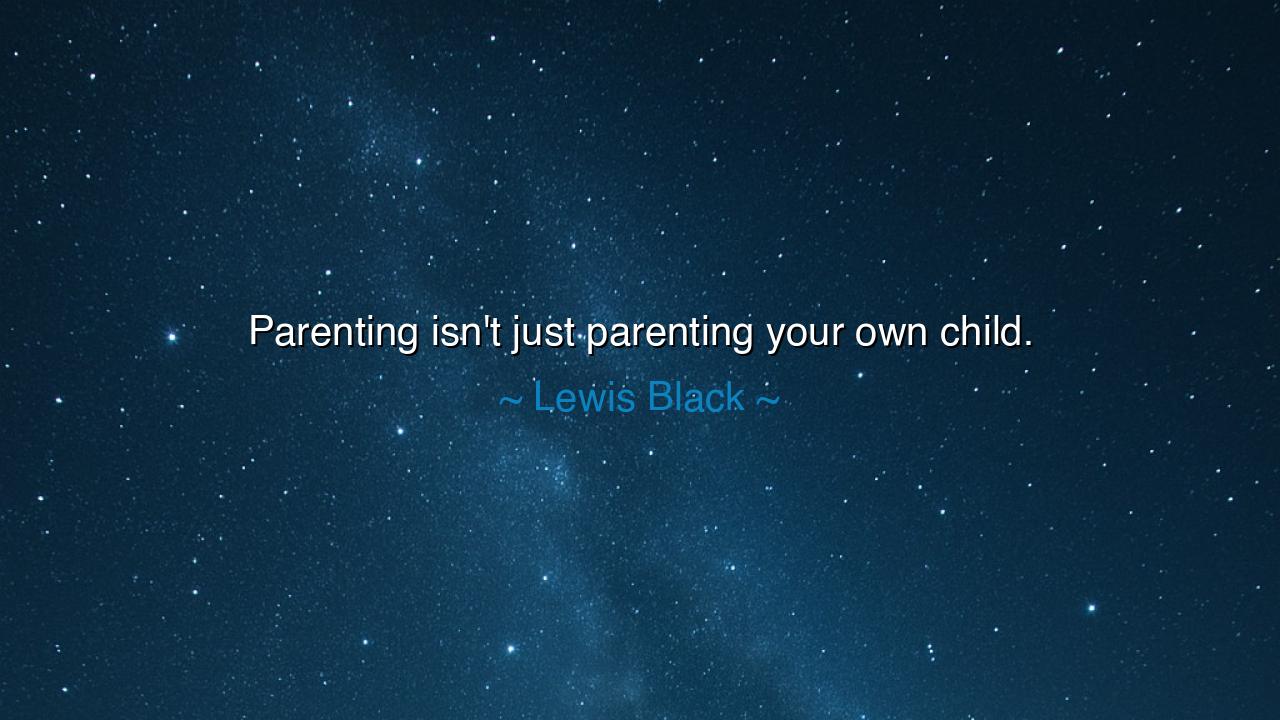
Parenting isn't just parenting your own child.






The words of Lewis Black—“Parenting isn’t just parenting your own child.”—reveal a truth that stretches beyond the walls of any single home. They remind us that the labor of raising the next generation is not contained by blood alone, nor limited to the bond between parent and child. Every act of care, every word of guidance, every moment of patience offered to a young soul—whether kin or stranger—is a form of parenting. To live among others is to carry responsibility for the children of the community, for the future does not belong to one family but to all.
The ancients knew this well. The Greeks spoke of the polis, the city-state, where the children of one family were considered the children of all, because each would grow to shape the fate of the community. In many African traditions, a proverb declares, “It takes a village to raise a child.” This is the same wisdom Lewis Black echoes: parenting is communal, not solitary. Though the parent bears the first duty, every neighbor, teacher, elder, and friend contributes threads to the weaving of a child’s soul.
History offers us many examples. Consider the young Alexander of Macedon. Though his father, King Philip, provided the resources of an empire, it was Aristotle, his teacher, who shaped his mind with philosophy, science, and strategy. The boy’s greatness was not solely the fruit of his father’s labor but of a wider circle of influence. Without Aristotle, Alexander might have remained merely a warrior; with him, he became a visionary, carrying ideas as well as armies across the world. This truth shows us that the raising of a child is the work of many hands.
Lewis Black’s words also remind us that influence can flow silently, without title or recognition. The neighbor who encourages a child, the coach who teaches discipline, the elder who tells stories by the fire—each plants seeds that may blossom years later. And likewise, harm can be done by neglect or cruelty from those outside the home. Thus, the burden of parenting beyond one’s own child is both noble and grave: to recognize that every word and every deed may help build or destroy the confidence of the young.
This truth is both inspiring and humbling. It means we must live with awareness, knowing that children are always watching—not only their parents but all adults. Our conduct becomes their education. The way we treat strangers, the way we bear hardship, the way we speak of others—all of this instructs them. To parent well is not merely to protect your own household, but to contribute to a world in which all children can flourish, safe in the presence of honorable examples.
The lesson is clear: live as though every child were your own. Do not say, “That is not my responsibility,” for the shaping of the young is the responsibility of all. If you see a child wandering in confusion, offer guidance. If you see a youth striving, offer encouragement. If you see a generation struggling, do not abandon them, for they will inherit the world you leave behind.
Therefore, let your actions be these: show kindness openly, for children will remember it; set examples of justice and humility, for they will imitate them; support parents around you, for their burdens are also yours. Recognize that your words, your patience, and your character are threads in the fabric of society’s future.
Thus, Lewis Black’s simple yet profound words endure as a torch: “Parenting isn’t just parenting your own child.” It is the shared work of humanity, the eternal responsibility that binds us together. To raise a child—any child—is to shape the destiny of the world. Let future generations remember this truth: the legacy of love and wisdom is never limited to blood, but belongs to all who dare to guide, protect, and uplift the young.






AAdministratorAdministrator
Welcome, honored guests. Please leave a comment, we will respond soon